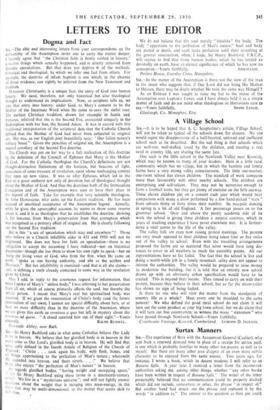A Village School
SIR,—It is to be hoped that A. C. Scupholme's article, Village School, will not be taken as typical of the schools down for closure. No one would regret the disappearance of a half-hearted, unloved and inefficient school such as he described. But the sad thing is that schools which are well-run, well-staffed, loved by the children, and meeting a real need in country life, are sharing the same fate.
One such is the little school in the Newlands Valley near Keswick, which may be known to many of your readers. Here is a little rural community which has no village, but in which the hamlets and lonely farms have a very strong valley consciousness. The little one-teacher, one-room school has eleven children. The standard of work compares more than favourably with other nearby schools. The children are enterprising and self-reliant. They may not be numerous enough to form a football team, but they get plenty of exercise on the fells anyway. These eleven children put on a concert each year which would bear comparison with many a show performed by a few hand-picked " stars " from schools thirty or forty times their number. Its maypole dancing in spring is a bit of old England. A fair percentage passes on to the grammar school. Over and above the purely academic side of its work the school is giving these children a natural courtesy, which in years of teaching experience I have never elsewhere met. It is further- more a vital centre to the life of the valley.
The valley folk are even now raising protest meetings. The parents are very much opposed to their children being taken four or five miles out of the valley to school. Even with the travelling arrangements proposed the farms are so scattered that some would have long dis- tances to cover in all weathers to reach the assembly points. All our representations have so far failed. The fact that the school is live and doing a worth-while job in a lonely mountain /alley does not appear to interest the authorities. The valley would be prepared to raise money to modernise the building, but it is told that an entirely new school drawn up with an obviously urban specification would have to be erected. This is beyond their means. They intend to carry on with their protest, because they believe in their school, but so far the steam-roller has shewn no sign of being halted.
Is there no one who will view the matter from the standpoint of country life as a whole? Must every one be moulded to the same pattern? We who defend the good rural school do not claim it will turn out the same product as your big town school, but we do claim that it will turn out fine countrymen, as witness the many " statesmen " who have passed through Newlands School.—Yours faithfully,
Crosthwaite Vicarage, Keswick, Cumberland. GORDON D. JACKSON.


























 Previous page
Previous page